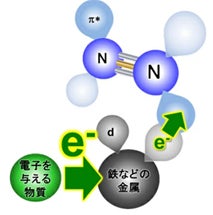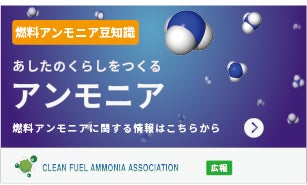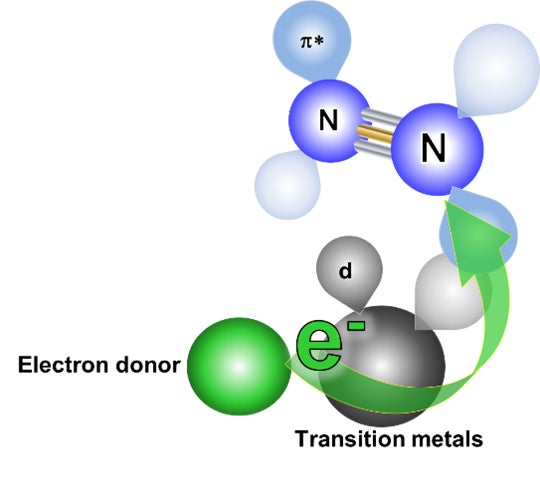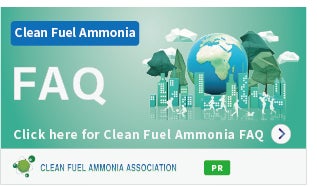東洋エンジニアリング株式会社(取締役社長 永松治夫、以下TOYO)は、国立大学法人東京工業大学(学長 益一哉、以下東工大)、Ammon Fields株式会社(取締役社 足立健太、以下Ammon Fields)、株式会社エフ・シー・シー(取締役社長 斎藤善敬、以下FCC)と6月14日付で、東工大原亨和教授らが開発した鉄-ヒドリド触媒*1を、燃料用アンモニア製造システムに適用することを目指し、実証に向けた触媒商業化の開発に共同で取り組むMOU(覚書:Memorandum of Understanding)を締結いたしました。
アンモニアは100年以上にわたり、窒素と水素を400–600 ℃、 15 – 20 MPaという高温・高圧下で合成されてきましたが、今回原教授が開発した、革新的な鉄-ヒドリド触媒を使用することにより低温・低圧(100 ℃ 、1 MPa)の条件でも優れた性能を発揮し、アンモニア合成時における省エネルギー化、CO2削減など多くのメリットを享受することができます。
また鉄-ヒドリド触媒は希少性の高い貴金属(レアメタル)を使用しない鉄触媒であり、経済性や安定供給という点でも優位性を有しています。
アンモニアは従来の肥料用途の他に、発電、船舶燃料、素材セクターのエネルギー源、そして水素キャリアとして社会実装に向けたロードマップが制定*2されています。将来的に、大きな需要が見込まれる燃料アンモニア製造を念頭において、中・大型設備に適した運転条件と本触媒を組み合わせることで、燃料アンモニアの製造コストの低減が期待されます。

各社は、鉄-ヒドリド触媒の実証に向けて、以下を実施いたします。
TOYO: 開発プロジェクト統括、エンジニアリング検証、事業化検討
東工大: 触媒研究・開発
Ammon Fields: 知財管理
FCC: 触媒開発・製造
TOYOと、東工大、Ammon Fields、FCCは鉄-ヒドリド触媒の開発を推進し、低コストで省エネルギーな燃料用アンモニアの製造技術の社会実装に取り組んで参ります。
*1 東工大/原教授らの開発した電子供与性に優れた新たな鉄系触媒。
アンモニアは、窒素と水素の反応で得られますが、反応メカニズム上、もっとも速度が遅く全体の反応速度に影響を与えているのが、窒素分子を窒素原子に分解する過程です。
この過程を促進するためには、鉄などの遷移金属から窒素分子へ電子を一時的に供与する方法が知られています。この電子供与性を高めるために過去、様々な工夫が行われてきましたが、原教授らは、資源量が豊富で経済性に優れた鉄に金属ヒドリドを複合することで、低温でも金属カリウムと同等の電子供与性を発揮する新たな鉄触媒の開発に成功しました(a)。金属ヒドリドとは金属原子に負の電荷を持った水素(ヒドリド, H-)が結合したものであり、鉄の電子供与性を促進する働きがあります。
本共同開発では、同コンセプト触媒の実証に向けた触媒商業化の開発に共同で取り組むことを目的としています。
(a) 東工大発表 https://www.titech.ac.jp/news/2023/066470

*2燃料用アンモニアに関して、2021年2月に燃料アンモニア導入官民協議会によってロードマップが策定されており、2030年までに燃料アンモニアの生産を拡大する必要があります。さらに、2050年までには、国内含む世界全体で1億トン規模の日本企業による調達サプライチェーンを構築することを目指しています。
■━━━━━━━━━━━━━━━━━━━━━□
┃ 燃料アンモニアに関する情報はこちらから ┃
□━━━━━━━━━━━━━━━━━━━━━■
▼燃料アンモニアとは?

▼よくある質問

English Follows
ーーーーーーーーーーーーーーーーーーーーーーーーーーーーーーーーーーーーーーーーーーーーーーーーーーー
MOU signed for commercialization of low-cost and energy-saving ammonia synthesis technology applying high-performance iron catalyst
Toyo Engineering Corporation (TOYO, President & CEO Haruo Nagamatsu) announced today that it reached an agreement with Tokyo Institute of Technology (Tokyo Tech, President of Tokyo Institute of Technology Kazuya Masu), Ammon Fields Co., Ltd. (Ammon Fields, President & CEO Kenta Adachi) and F.C.C. Co., Ltd. (FCC, President & CEO Yoshitaka Saito, FCC) to execute a Memorandum of Understanding (MOU) on joint development or commercialization of Iron-Metal Hydride catalyst developed by Prof. Hara of Tokyo Tech on June 14, 2023.
Ammonia has been synthesized from N2 and H2 at 400-600℃ and 15-20 MPa for over 100 years. As a recent development, the innovative Iron-Metal Hydride catalyst*1 has been announced to exhibit excellent performance under low temperature and pressure condition : 100℃, 1MPa , therefore it provides advantages of saving energy and CO2 emission during ammonia production.
As the Iron-Metal Hydride catalyst does not contain precious metals (rare metal), there are advantages for economical and sustainable supply.
In addition to the conventional use of ammonia for fertilizer production, a roadmap has been formulated for social implementation*2 as an energy source for power generation, marine fuel, industrial, and as a hydrogen carrier. Focus on fuel ammonia, which is expected to have significant demand in future, will reduce the production cost by combining the Iron-Metal Hydride catalyst and appropriate operating conditions in medium and large scale facilities.

In demonstrating the Iron-Metal Hydride catalysts performance, each company has the following roles.
Contract Summary
TOYO: Management and coordination of the Project, Engineering Validation, Commercialization Study
Tokyo Tech: Research and development of the catalyst
Ammon Fields: Management of intellectual property (IP)
FCC: Development and manufacture of the catalyst
TOYO, Tokyo Tech, Ammon Fields and FCC promote development of Iron-Metal Hydride catalyst and strive for the social implementation of low-cost and energy-efficient production technology of fuel ammonia.
*1 A highly efficient catalyst with excellent electron-donating performance developed by Prof. Hara of Tokyo Tech.
Ammonia is synthesized from N2 and H2, while the decomposition reaction of N2 molecules into atoms is the rate-limiting reaction.
It is well known that transition metals such as iron temporarily donate electrons to nitrogen molecules in order to accelerate this process.
Various attempts have been made in this field in the past, however, Professor Hara’s group has succeeded in developing a new catalyst with excellent electron-donating properties by compounding metal hydride with iron, which is an abundant resource and is highly economical.
A metal hydride is metal atoms bound to negative charged hydrogens (Hydride, H-), which promote electron donation to iron.
In this joint development, individual parties are actively engaged in the development of commercialization for catalyst with the concept.
(a) Announcement from Tokyo Tech https://www.titech.ac.jp/english/news/2023/066600

*2 A roadmap was developed in February 2021 by the Public-Private Council for Fuel Ammonia Introduction, and it was agreed that the production of fuel ammonia must be expanded by 2030. Furthermore, by 2050, the council aims at an ammonia supply chain of 100 million tons worldwide to be developed by Japanese companies.
■━━━━━━━━━━━━━━━━━━━━━━━━━□
Visit our website to learn about Clean Fuel Ammonia
□━━━━━━━━━━━━━━━━━━━━━━━━━■
▼Clean Fuel Ammonia FAQ



